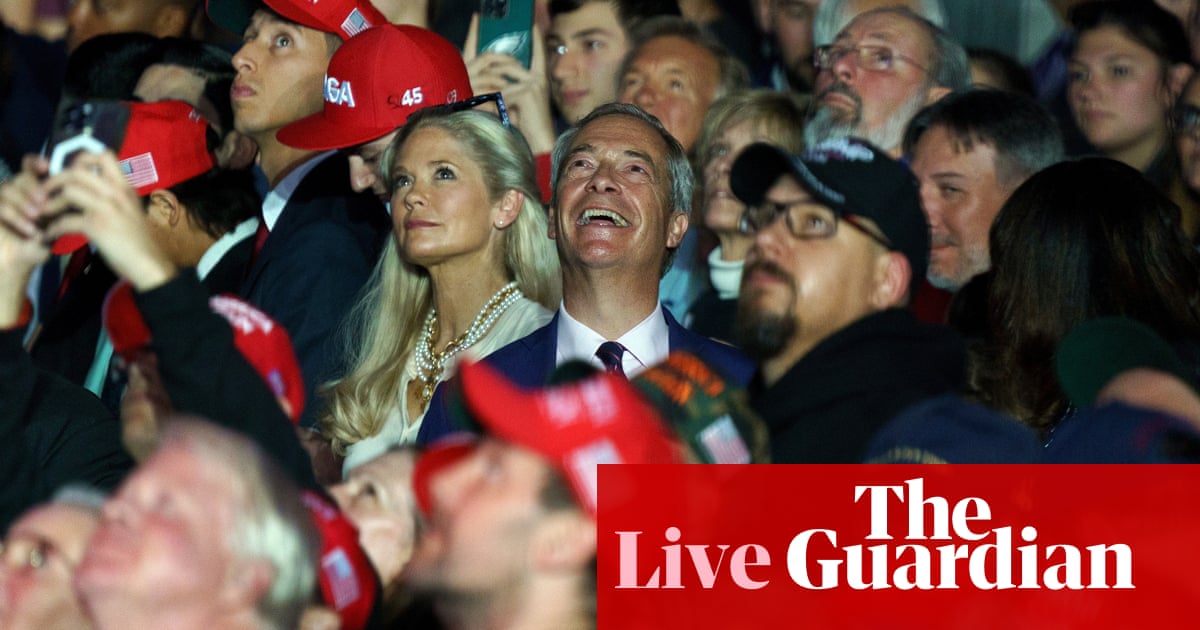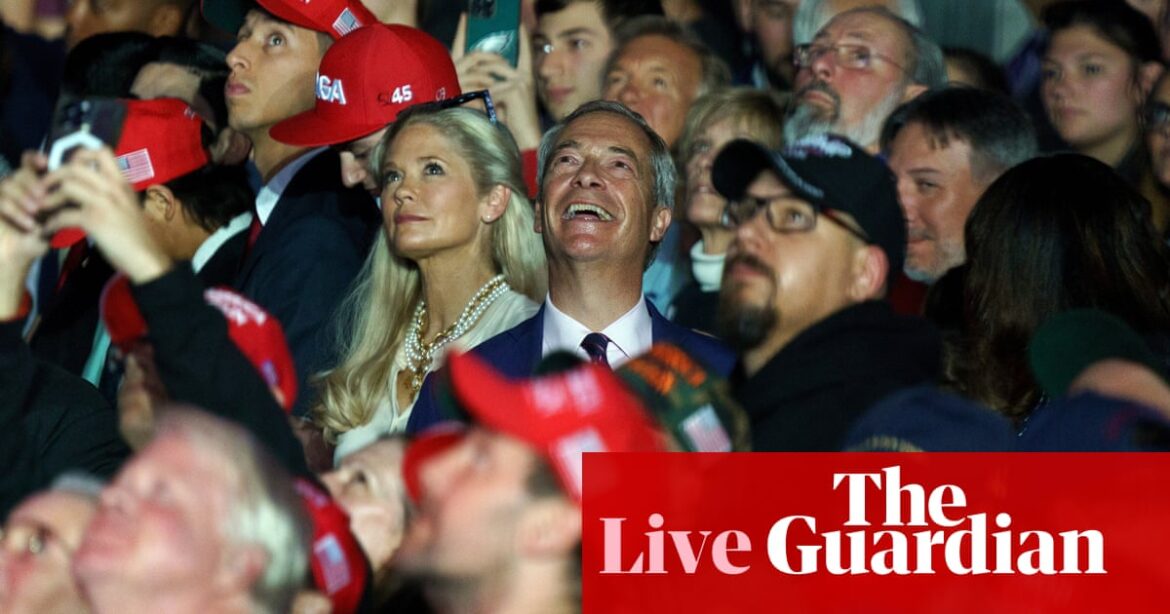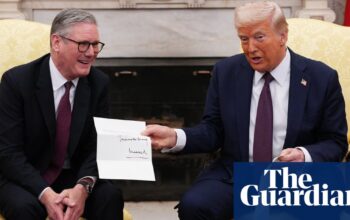
Farage, who counts Trump as a personal friend, says:
Perhaps the biggest worry that Sir Keir Starmer faces in policy terms is that Trump has announced a big tariff regime. Britain is, potentially, in a fortunate position. Such tariffs might be avoided – but only by direct negotiations with Team Trump, something of which Starmer’s friends in the European Union would not approve. Which way will Starmer jump?
Offering to help, Farage goes on:
Britain is really going to have to roll out the red carpet for Trump very quickly. If we don’t, a great opportunity will be squandered.
I’m overjoyed that this process has already begun, with our very sensible Speaker of the House of Commons, Sir Lindsay Hoyle, making clear that Trump will be able to address parliament during his State visit next year.
However, there is no time to waste. If I can be helpful in any way when it comes to bridging the divide that exists between Starmer’s government and Trump, I will be glad to assist.
I might not agree with almost anything that Starmer and his cabinet stand for, but I do believe in something called the national interest.
Asked about Farage’s offer in an interview with Times Radio, Pat McFadden, the Cabinet Office minister, said the government did not need his help. “I think we’ll have our own relationships,” he said.
Labour is now challenging Kemi Badenoch to explain what investment her party would cut.
In an open letter to the new Conservative leader, Ellie Reeves, the new Labour party chair, says:
Last night the Conservative party decided to vote against Labour’s plans to bring down waiting lists in the NHS and hire new teachers in state schools. Your party opposed £5.5bn of investment in public services – the equivalent of 10,200 nurses in our NHS, 27,600 teachers in our schools, or 39,100 police officers on our streets.
I am writing to you to confirm your official position – are the Conservatives against additional investment in our public services or would you make cuts to other public services to fund these pledges from elsewhere?
This government inherited a £22bn black hole in the public finances, a black hole that you and your shadow cabinet helped to create, along with broken public services after 14 years of Tory failure.
Labour’s budget is fixing the foundations to deliver the change Britain voted for. The chancellor announced £25.6bn in new funding for the NHS over the next two years – which will help to fund 40,000 additional NHS appointments a week – alongside funding to recruit 6,500 teachers in state schools.
Under your instruction, Conservative MPs have voted against these measures. This will be a slap in the face for communities across our country who voted for change.
HS2 high-speed line has risen to more than £100m, HS2’s chair has revealed. Gwyn Topham has the story.
an article for the Spectator about the first shadow cabinet chaired by Kemi Badenoch, the new Conservative leader. Balls says Badenoch wants shadow cabinet meetings to be smaller than they used to be so they are less likely to leak. “It’s a shame our discussions in shadow cabinet were leaked,” Badenoch said in July, after what was said at the first meeting of the shadow cabinet since the general election was leaked. “If there is no private space to discuss our party’s challenges, we will never fully address what the electorate told us last week.”
Thankfully, the campaign against shadow cabinet leaking does not seem to be working. Balls seems to have had a very thorought readout, and her account is an excellent read. Here’s an extract.
Iain Duncan Smith gave a presentation on how to do opposition well. While a respected figure, it raised some eyebrows around the table given his own struggles as leader. He urged the new frontbench to wage the war of the flea. He explained that the Labour government represented a big elephant and it was the job of the remaining Tories to do the job of the flea: they can’t match their opponent in size but they can annoy and confuse.
As for the general strategy, the new Tory co-chairman Nigel Huddleston was asked what the plan was to win back Reform party voters. He said he was looking into it. The most interesting intervention came at the end of the meeting from [Robert] Jenrick. After a rather bitter leadership contest, he made a big point of calling for unity. ‘Your success is our success,’ he told Badenoch. The comments landed well with the new leader – but not everyone was convinced. ‘It was the most insincere thing I’ve ever seen,’ said one colleague afterwards.
official response to Donald Trump’s win – issued despite the first minister having told reporters he supported Kamala Harris last week. Harvie said:
He wrote that he is sure Scotland’s cultural and social ties with the US will flourish during the presidency of a misogynist, a climate denier, a fraudster, a conspiracy-monger, a racist, a far-right politician who tried to overturn an election result, both covertly and by inciting violence. Words fail me. What social and cultural ties does the first minister really think will benefit from a relationship with such a man?
Swinney responded that, as first minister of Scotland, he had a duty to engage with other governments and that there were deep cultural, social and economic ties between Scotland and the USA.
But he added:
There are, very clearly, very big, real differences in expression and in priority and in way of life between me and Donald Trump.
Donald Trump could harm UK-US relations.
Speaking to reporters in Manchester, and echoing the line taken by Pat McFadden in interviews this morning (see 10.06am), she said:
Well, look, the vice president-elect of the United States has used some choice words about the president-elect in the past, but the point is those comments were in the past.
The prime minister and the foreign secretary met with President-elect Trump just a few weeks ago in New York for dinner.
They had a really good meeting a constructive meeting and I have absolutely no doubt we will be able to work constructively with the new US administration under President-elect Donald Trump.
it too would be voted out. During his interviews this morning Pat McFadden did not quite go that far, but he said the American election showed why Labour was focusing on the cost of living. (See 10.47am.)
In an article for LabourList, Liam Byrne, the former Labour Treasury minister who now chairs the Commons business committee, makes a similar version of the same argument; he says Trump’s victory shows that Labour could lose the next election if it does not reduce wealth inequality.
Byrne, who published a book this year called The Inequality of Wealth, says:
It will be a few days until we have time to inspect the details of Vice President Harris’ defeat. But there was one clear story about the last time President Trump sailed to victory. The places that were left behind by American growth, the places at the sharp end of growing inequality, were far more likely to vote for Trump.
But guess what?
The same dynamics hold true for the UK, France, and Scandinavia. Those places where the growth in wealth did nor keep pace with the national average were the places that voted for Brexit, Le Pen in France and the Far Right in Scandinavia.
In his article Byrne highlights recent research the Policy Institute at King’s College London and the Fairness Foundation showing that people expect economic inequality to get worse in the UK over the course of this parliament.
Byrne has also put a thread on social media summarising his argument. Here is his conclusion.
CONCLUSION: The warning is clear. Labour has to fix address the inequality tearing at our social fabric. If we fail, populism will only grow stronger. We need not just economic investment, but a path for real prosperity for the families and regions left behind
a news release explaining who is affected, the Foreign Office said:
New targets include suppliers supporting Russia’s military production, Russian-backed mercenary groups operating in sub-Saharan Africa and a GRU agent involved in the use of a novichok nerve agent in Salisbury [Denis Sergeev].
These sanctions will directly target the supply of goods to Russia’s military and constrain vital resources crucial to conduct Putin’s illegal war in Ukraine.
Today’s action targets entities based in China, Turkey and Central Asia involved in the supply and production of goods including machine tools, microelectronics and components for drones, all of which Russia needs to support its illegal invasion of Ukraine …
This latest package also targets three private mercenary groups with links to the Kremlin, including Africa Corps, and 11 individuals associated with Russian proxies. These targets have direct links to the Kremlin, have threatened peace and security in Libya, Mali and the Central African Republic, and have committed widespread human rights abuses across the continent.
Labour party.
In a statement today, Cheshire police said:
Mike Amesbury MP, of Frodsham, Cheshire, has been summonsed to court to face the charge of section 39 assault.
The 55-year-old is set to appear in magistrates’ court at a later date.
The charge relates to reports of an assault on a 45-year-old man on Main Street, Frodsham, which was reported to police at 2.48am on Saturday 26 October.
Amesbury is MP for Runcorn and Helsby.
a statement ahead of today’s meeting, Starmer said:
There is a criminal empire operating on our continent, exacting a horrendous human toll and undermining our national security.
Backed by our new Border Security Command, the UK will be at the heart of the efforts to end the scourge of organised immigration crime – but we cannot do it in isolation.
We need to go further and faster, alongside our international partners, and take the fight directly to the heart of these vile people smuggling networks. I will be making this the central feature of my discussions at the European Political Community meeting today.
an article for the Daily Telegraph, Farage says he believes that Trump’s victory is a sign that “politics, including our own, is moving rightwards”. He admits Trump’s tariff problems could cause problems for the UK, but he suggests Keir Starmer could mitigate the impact if he is willing to engage in some diplomatic schmoozing.
Farage, who counts Trump as a personal friend, says:
Perhaps the biggest worry that Sir Keir Starmer faces in policy terms is that Trump has announced a big tariff regime. Britain is, potentially, in a fortunate position. Such tariffs might be avoided – but only by direct negotiations with Team Trump, something of which Starmer’s friends in the European Union would not approve. Which way will Starmer jump?
Offering to help, Farage goes on:
Britain is really going to have to roll out the red carpet for Trump very quickly. If we don’t, a great opportunity will be squandered.
I’m overjoyed that this process has already begun, with our very sensible Speaker of the House of Commons, Sir Lindsay Hoyle, making clear that Trump will be able to address parliament during his State visit next year.
However, there is no time to waste. If I can be helpful in any way when it comes to bridging the divide that exists between Starmer’s government and Trump, I will be glad to assist.
I might not agree with almost anything that Starmer and his cabinet stand for, but I do believe in something called the national interest.
Asked about Farage’s offer in an interview with Times Radio, Pat McFadden, the Cabinet Office minister, said the government did not need his help. “I think we’ll have our own relationships,” he said.
the latest figures show.
This is up 10% compared to the previous three months and a rise of 15% on the same quarter in 2023.
The Home Office said the number of referrals for the latest three-month period is the highest since the National Referral Mechanism (NRM) began in 2009.
The previous record was 4,742 referrals between January and March 2023.
To access support and have recognition of their circumstances in the UK, victims of slavery and human trafficking have to be assessed under the NRM.
Almost a quarter (23% or 1,092) of referrals were of UK nationality, with the second most common being Albanian (11%; 523) and Vietnamese (11%; 514).
Some 74% of UK nationals referred into the system were children, while 91% of the Albanian nationals and 81% of Vietnamese nationals referred were adults.
Donald Trump will have been the former Labour cabinet ministers David Miliband and Peter Mandelson. Karen Pierce, the current UK ambassador to Washington, is due to leave early next year and Keir Starmer decided to wait until he knew who the next president would be before appointing a successor.
If Kamala Harris had won, given the close links between the Democratic party and Labour, Starmer was expected to appoint a politician as ambassador, and Miliband, a former foreign secretary, and Mandelson, a former business secretary and European commissioner, were both reportedly high on the shortlist.
With Trump going to the White House next year, Starmer is now expected to follow normal practice and replace Pierce with another professional diplomat.
But Pierce herself has good links with the Trump team and, in his interview on Sky News this morning, Pat McFadden, the Cabinet Office minister, implied Pierce would have her term in office extended. Asked if she would be staying, he replied:
Karen Pierce is ambassador in the United States at the moment. She is doing an excellent job. She’s got the full confidence of the British government, and we want her to keep on doing the job that she’s doing. And I think she’s going to be a very important interlocutor and adviser for the UK government in this period of transition.
Asked if Pierce would stay in post at least for the whole of 2025, McFadden said:
I can’t say exactly when her term will end. She’s been doing it for a few years. She’s there for the moment, she’ll be there for a while, and she’s doing an absolutely fantastic job for her country.
a story in the Independent about an allegation that Kemi Badenoch made a joke about rape in a social media post in 2008, a spokesperson for the new Conservative leader said that Badenoch has been clear “she believes this sort of ‘offence archaeology’ has no place in political debate”.
But, when it comes to what Labour politicians have said about Donald Trump in the past, Badenoch is no slouch at offence archeology herself. She devoted her first ever question as Tory leader to Keir Starmer at PMQs to the subject yesterday.
As Peter Walker reports in a roundup of what politicians have said about Trump, Badenoch herself said she was “not a Trump fan” in a post on Twitter in 2017, when she was a member of the London assembly. Labour politicians have been much, much more critical. The Spectator has a fairly comprehensive list here.
It is entirely legitimate to query what impact all these comments will have on the government’s relationship with the incoming Trump administration. Asked about all these comments, in an interview on Sky News this morning Pat McFadden, the Cabinet Office minister, insisted they would not harm the UK-US relationship.
I think a lot of things that have been said over the years, but not just here in the UK, including in the US. If you look at what vice-president-elect JD Vance said about President Trump, he mused whether this was going to be another Richard Nixon or America’s Hitler, and it’s not held him back from being the running mate.
Elon Musk as well, advised Trump to walk off into the sunset a couple of years ago, and he’s become President Trump’s biggest backer in business.
I don’t think any of these things will interfere in what is such an important alliance for the world, based on defence, security, shared values, shared history.
It’s all more important than all of those things, and that is the footing we begin on, and that’s the footing that we’ll continue on.
the long list of derogatory comments about Trump made by David Lammy, the foreign secretary, and many other Labour politicians in the past. He did not apologise for them, or even disown then, but he also made it clear that he was not keen to dwell on them either, and he implied that ultimately those comments would not matter much. In an interview with Sky News, asked if he would be able to forgive someone who called him a “woman-hating, neo-Nazi sympathising sociopath” (as Lammy called Trump), McFadden replied:
I think in the end the relationship between the two countries is just much deeper than stuff like that … One thing I know as a cabinet member in the British government is the friendship between the United States and the United Kingdom is really important, it’s beneficial for both countries, and it’s in our national interest to maintain that.
But McFadden also implied there was an element of ‘hope for the best’ in the UK’s approach. Asked about Trump’s plan to impose tariffs of at least 10% on British imports, which economists say could halve UK growth, McFadden replied:
I think you’ve got to understand that in an election, a lot of fiery things are said, and President-elect Trump says a lot of fiery things, and the important thing is what he actually does.
We obviously have interests as a trading nation. We want to protect and look after our interests, and we always want to have a dialogue with the US administration about those.
But for anyone speculating about what exactly will happen, I would advise let’s wait to see what he actually does, rather than take everything said in a campaign.
Labour itself offers a good example of how what a party does in government does not always correlate with what it said it was expecting to do during the election campaign that put it there.
Today parliament is having a short recess, which means there is no Downing Street lobby briefing. Keir Starmer is in Budapest for a meeting of the European Political Community. He is not due to hold a press conference, but we are expecting some broadcast clips from him in the afternoon. Rachel Reeves, the chancellor, is on a visit to Manchester, and it’s FMQs at Holyrood. Otherwise the diary looks light.
If you want to contact me, please post a message below the line or message me on social media. I can’t read all the messages BTL, but if you put “Andrew” in a message aimed at me, I am more likely to see it because I search for posts containing that word.
If you want to flag something up urgently, it is best to use social media. I’m still using X and I’ll see something addressed to @AndrewSparrow very quickly. I’m also trying Bluesky (@andrewsparrowgdn) and Threads (@andrewsparrowtheguardian).
I find it very helpful when readers point out mistakes, even minor typos. No error is too small to correct. And I find your questions very interesting too. I can’t promise to reply to them all, but I will try to reply to as many as I can, either BTL or sometimes in the blog.
Source: theguardian.com



